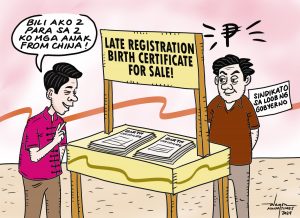 WE HAVE been battling the COVID19 pandemic for over a year now and it seems we still have a long way, if ever the time will come, when we can say it is over.
WE HAVE been battling the COVID19 pandemic for over a year now and it seems we still have a long way, if ever the time will come, when we can say it is over.
Meanwhile, we continue to hear news of several more relatives, friends, colleagues who have caught the virus – some mild, others worse, and a few who have died.
The battle really starts in the home, among household members to be knowledgeable and take responsible attitudes and actions to ensure one does not catch the dreaded virus.
And when any member does catch it, the family needs to know what is needed to prevent it from spreading and how to help keep the one who caught the virus to overcome it.
For this article series, I consolidated some research to help families know practical steps to take to win in this battle against the dreaded virus. I asked a dear friend, Dr. Glo Fabrigas, who is the acting City Health Officer in Tacloban City for some advice based on her experience of helping families.
I also watched several videos of doctor talks and of people who caught the virus and the tips they gave that helped them get well even without going to the hospital. I joined two support groups on FB of Phil. COVID survivors to gain insight on what works based on their experiences. Here are some of the things I learned that could be helpful for families.
The family needs to discuss the protocols especially for those household members who go out and could possibly contract the virus and bring it home. Agree on what protocols everyone should observe when the family goes out and make sure they are observed. We tend to get lax on these as the situation drags on but we cannot let our guard down.
1. Discuss ahead what steps to take if anyone in the family starts feeling any of the symptoms – loss of smell, taste, fever, cough, fatigue, shortness of breath, sore throat, diarrhea, headache. Even if you do not feel any symptom but may have been exposed, you may be contagious within 12-14 days and should quarantine yourself.
2. Designate an isolation room, separate utensils to be used and procedures to disinfect the house (lysol, alcohol, clorox, UV light).
3. Have the hotline numbers ready to call in the purok/barangay/municipality/city if COVID is suspected and place your home in quarantine.
4. Have the number of a family doctor or teleconsult doctors to inquire steps on what to do.
5. It is best to strengthen everybody’s immune system as prevention and also in battling with COVID. Eat fresh fruits, plenty of vegetables, nutritious food.
6. Get some sunshine and exercise. Drink lots of water daily according to your body weight. Get the recommended sleep daily.
7. Take supplements to boost one’s immune system – Vitamin D3 with K2, C, Zinc.
8. Recovery cannot be rushed, so rest is essential once you catch the virus. When symptoms appear, have yourself tested.
There are two kinds of tests available: Rapid Antigen test that detects protein fragments specific to coronavirus where results can be known within 15 minutes; and RT-PCR swab test that detects the virus’ genetic material which can be known within 2-3 days even with those who are asymptomatic.
Rapid test is best given to those with symptoms already, and may not give accurate results if given too early in their infection or for those with no symptoms. Those who had COVID shared they tested positive even after three months after recovery so it is advisable not to take these expensive tests within that time frame after recovery. (To be Continued)


